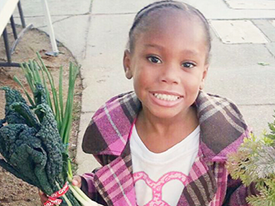 From the Superbowl to the Oscars, this past month activists and celebrities have refused to be silent about racial inequality, using social media campaigns – #BlackLivesMatter, #OscarsSoWhite – to amplify the message that the status quo is unacceptable in 2016. The Oscars held up a mirror to the persistent race-based lack of opportunity. Black Lives Matter transformed our collective awareness of the violence visited on black bodies.
From the Superbowl to the Oscars, this past month activists and celebrities have refused to be silent about racial inequality, using social media campaigns – #BlackLivesMatter, #OscarsSoWhite – to amplify the message that the status quo is unacceptable in 2016. The Oscars held up a mirror to the persistent race-based lack of opportunity. Black Lives Matter transformed our collective awareness of the violence visited on black bodies.
As we turn our calendars from Black History month to National Nutrition month, we are grateful for the vital work of a previous generations of activists. In 1969, the Black Panther Party founded a free breakfast program for children at a church in Oakland. By the end of the year, the organization had fed 20,000 kids in 19 cities across the US before they went to school in the morning. Their work served as the blueprint for the Federal Government’s School Breakfast Program, which was established a few years later. Melvin Dickson, one of the Black Panther organizers, said, “One thing you can guarantee in an oppressed community is that you’re going to find hunger.”
Over forty years later, lack of access to healthy, affordable food and predatory advertising that targets communities of color are aggravating health disparities. Our food system makes cheap, unhealthy food readily available, puts fresh fruits and vegetables out of reach, and shortens, hinders, and sickens the lives of people of color disproportionately. The Ecology Center envisions a world where healthy food is readily accessible, regardless of race or income level, and where diet-related diseases are not part of a life expectancy gap for the black community. To that end, we are increasing healthy food access through our nutrition incentive program, Market Match, and through community produce stands with our youth-led Farm Fresh Choice program. Last year, we fought hard to pass Measure D, which is now funneling soda tax revenue to nutrition programs in our schools. The intersection between racial justice, nutrition, and agriculture is a space historically rich with visionary changemakers. And it continues to be. For more on how one program in New York is making the link between food & farming and Black Lives Matter, read this excellent piece originally published in Yes! Magazine last year.



